
|
Sale 66
The Manuscript, Space, Stamp & Collectibles Auction
| Royalty & Foreign Leaders |
| |
| |
| Lot |
Photo |
Description |
Realized |
Lot 63 |
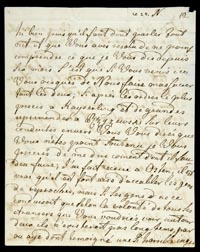 |
Catherine II (1729-96) Empress of Russia (1762-96); called Catherine the Great. Born a minor German princess, she married Grand Duke Peter, the weak and incompetent successor to the Russian throne, in 1745. In July 1762, six months after becoming Tsar, Peter was deposed and murdered and Catherine succeeded him. She was devoted to art, literature, science, and politics. She also greatly expanded the Russian Empire.
Manuscript Letter unsigned but with Catherine's black wax seal, two and one-third pages, in French, n.p., N[ovember] 27, n.y. (c. 1757-58). Integral address leaf says "For Le Stolnia / Count Poniatowski." ("Stolnia" was a title used by Poniatowski during 1757-58). Written while still married to Peter, during her affair with Poniatowski.
"Very well, since it's necessary to speak very plainly and since you have decided not to understand what I have been telling you for six months, it's that if you come here, you run the risk of having both of us massacred. If, after the most specific orders to Kayserling [Catherine's ambassador to Poland] and the numerous reprimands to Rzyzewski on their behavior towards you, you say that you are by no means backed, I beg of you to tell me what will have to be done. I had Osten written to. It is true that he is quite comfortable in reproaching people, but if people only behaved according to the will of others around them, they would not last very long. Have I thus displayed such a horrible ingratitude, is it because I prevent you and by no means want you to come here? There is thus far nothing to complain about in my opinion. I have told you that even our letters do not mean anything, nothing at all and if you were prudent, you would take care not to write them, simply giving everything that concerns business to Kayserling to send to me. The last letters were almost taken by thieves and it would have been a fine mess if my bundle had been opened and handed in. Ministerally, I lived all of your letters and was not prepared afterwards for the strongest ones. Because of my most sincere friendship for you and yours, I will be accused of utter ingratitude. You will say what you will; however, I will do all I can for your family in standing by you as best I can."
Stanislaus Poniatowski (1732-98) became the last king of Poland in 1764 with the help of Catherine. They had met in 1755 while Poniatowski was in the service of England's ambassador to St. Petersburg, Sir Charles Hanbury-Williams. Catherine and Poniatowski had a five-year affair which produced a daughter, Anna (January 1758), who died in 1759.
Estimated Value $3,000 - 5,000
View details and enlarged photos
| Realized
$6,300 |
Lot 64 |
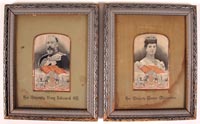 |
[Edward VII and Alexandra], Individual silk portraits bearing woven "Rd No. 370718" under Edward and woven" Rd No. 370915" under Alexandra, both under the Royal Arms. Visible portion of each is 4 x 2½ inches, matted and housed in matching 8 x 6 inch frames. Printed on the mats: "Woven In Silk. His Majesty King Edward VII. Registration Applied For " and the same for the queen except, "Her Majesty Queen Alexandra." Dampstaining to the mattes but no visible damage to the silk portraits.
Estimated Value $200 - 300
View details and enlarged photo
| Unsold |
Lot 65 |
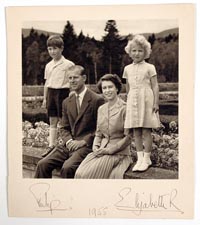 |
Elizabeth II, and Philip, Duke of Edinburgh (1926 -) Queen of Great Britain and Northern Ireland. Elizabeth and Philip married in 1947; she ascended to the throne in 1952 upon the death of her father, George VI. Photograph Signed ("Elizabeth R") as Queen, and "Philip" as Duke of Edinburgh, and dated "1955," 8 x 7 inches. Picturing the Queen and Philip with young Prince Charles and Princess Anne. Lightly toned; there are a couple of small spots to the right of Philip's signature, else fine. A charming photo.
Estimated Value $400 - 600
View details and enlarged photo
| Realized
$432 |
Lot 66 |
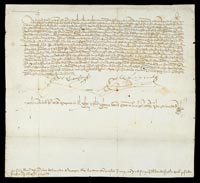 |
Ferdinand II of Aragon and Isabella I of Castile and Leon, Ferdinand (1452-1516) and Isabella (1451-1504) married in 1469. They were granted the title "the Catholic Monarchs" (Los Reyes Católicos) by Pope Alexander VI. Zealous Catholics, the year 1492 was a momentous one for them: They succeeded in expelling the Moors, who had ruled parts of the Iberian Peninsula for over 700 years; they drove out all Jews who would not convert to Catholicism; and they sponsored Christopher Columbus on an expedition to reach the Indies, a trip which would discover a New World for Europeans and lay the base of the Spanish Empire.
Extremely rare Manuscript Document Signed by Ferdinand as King ("Yo el Rey") and by Isabella as Queen ("Yo la Reina"), one page, 10¾ x 12 inches, Barcelona, October 18, 1493. Fine condition. Beautifully penned and boldly signed by both monarchs. Concerning the Armada of Vizcaya, a military escort which had been created to protect Columbus on his second trip to the New World.
In full: "Don Fernando and Dona Isabel, by the grace of God, King and Queen of Castile, of Leon, of Aragon, of Hispalia [Sevilla], of Granada, of Toledo, of Valencia, of Galicia, of Mallorca, of Sicily, of Sardinia, of Cordoba, of Algarve, of Murcia, of Jaryna, of the Algarves, of Algecira, of Gibraltar, of the Canary Islands, Count and Countess of Barcelona, Lords of Viscaya [Biscay] and of Inolina, Counts of Rousillon and Cerdagne, Lords of Oristan and of Goacano.
To you, the councils, justices, ---s, 24's (city aldermen), knights, jurors, squires, craftsmen and good men of each and every city, villa, town and seaport of the province of Andalucia and to each and every one.
You to whom this letter of ours is shown, or its copy duly signed and sealed, know that from the captain-general our other captains and people of our Armada of Viscaya, word has reached us that in all the said cities, villas and towns (or in some of them), certain duties have been demanded on the items purchased for the provisioning as well as the equipping and maintenance of our said Armada, duties not to be paid according to use and ancient custom followed and kept until now in similar Armadas, in which they (our captains) and our said Armadas are said to receive great insult and harm. And we were requested to give a ruling in this matter according to our grace. And we decided it was fitting to do so.
Therefore, if it is true that from times past until the present it has not been customary for such Armadas to pay the said duties in the said cities, villas and towns, by this our letter, or by its said copy duly signed, we command you from this day forth not to demand or request payment of the said duties nor any (part) of them on the items purchased necessary for our said Armada. You are to cause to be kept and to keep entirely the said custom used and kept until now, of not paying the said duties, without making any innovation in this matter. This we command you to do and to comply, under pain of our grace (displeasure) and of ten thousand maravedis for our treasury, for each of you who contravenes our order. In addition, we order the man who shows you this our letter, or its said copy duly signed, to summon you to appear before Us in court, wherever we may be, to summon you until you hand over the first five thousand (or the full ten thousand) maravedis, on said pain, for which we command that whoever is called to testify to hand over to (the bearer of this letter) testimony signed with his sign, so that we may know how our orders are obeyed.
Given in the city of Barcelona at 18 days of the month of October, year of the resurrection of our Lord Jesus Christ one thousand four hundred and ninety and three years. I the King. I the Queen."
Under the leadership of Prince Henry the Navigator (1394-1460), Portugal had made innovations in navigational techniques which placed her at the forefront of maritime exploration. The primary goal of these explorations was to find a direct sea route to China and India to buy the spices and other luxuries to which Europeans had become accustomed. Portugal explored the west coast of Africa and jealously guarded her trade route there. In 1488, sailing for Portugal, Bartolomeu Dias rounded the tip of Africa (Cape of Good Hope), a major step in establishing an eastern trade route. After Columbus returned in March 1493 from his first voyage, declaring that he had reached outlying islands of China or Japan, word reached the Catholic Monarchs that John II of Portugal was putting together ships to follow Columbus to the land that he had discovered. They enlisted the support of Spanish-born Pope Alexander VI to protect their new discoveries against claims by Portugal, but they also took action themselves, putting together the Vizcaya Armada to accompany and protect Columbus on his second trip. Plans for the Vizcaya Armada had begun in September 1492 and went into high gear after Columbus' return. The show of force would also serve to put pressure on Portugal to agree to mediation regarding newly-discovered lands.
The Portuguese proved amenable to Pope Alexander's division of the Earth outside of Europe. In May 1493 he established an imaginary line in the mid Atlantic, 100 leagues (480km) from the Cape Verde islands. Spain could possess any unclaimed land to the west of the line and Portugal would own any land to the east. Feeling somewhat reassured, Ferdinand and Isabella sent a letter to Bishop Fonseca (their chaplain and newly-appointed colonial administrator of the Indies) on September 5, 1493, commanding him to urge Columbus to sail at once, which he did, leaving Cadiz on September 24, 1493. Instead of accompanying Columbus on his voyage, the Vizcaya Armada was commanded to sail for North Africa taking Boabdil, the Moorish King of Granada, whom they had defeated on January 2, 1492, and some 6,000 Moorish prisoners. The Armada left for the port of Adra, in Almeria, on October 3, 1493, and returned to Spain on February 3, 1494.
There was no further interference from the Portuguese, but once they realized that the Spanish had much more land than they did, they asked that the line established by Alexander VI be renogotiated, which it was in June of 1494. The Treaty of Tordesillas re-established the line at 370 leagues (1,770 km) west of the Cape Verde Islands. After the Treaty of Tordesillas was ratified, the Vizcaya Armada was sent to Sicily to join 20 other ships preparing to fight against the Turks.
References:
Miguel-Angel Ladero Quesada, "La 'Armada de Vizcaya' (1492-1493): Nuevos datos documentales," En la España Medieval, 2001, 24: 365-394.
Juan Pérez De Tudela, "La Armada de Vizcaya. Acerca de una razón de fuerza y otros argumentos en el acuerdo de Tordesillas," El Tratado de Tordesillas y su proyección, Valladolid, 1973. Vol. I, pp. 33-92.
Estimated Value $250,000 - 300,000
View details and enlarged photos
| Unsold |
Lot 67 |
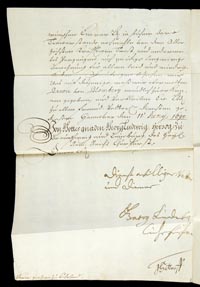 |
George I (1660-1727) Elector of Hanover; King of England and Ireland (1714-27).Manuscript Letter Signed ("Georg Ludwig") as elector of Brunswick - Lüneburg (Hanover), two pages, 12 x 7¾ inches, Hanover, June 11, 1698. Sending condolences to Elisabeth Sophie of Brandenburg (1674-1748), on the death of her husband (Duke Frederick Casimir Kettler of Courland). Light soiling; partial fold separations to integral address leaf. With black wax seal ("Georgius Ludovicus…"). Written less than five months after George's uncle Ernest Augustus died on Jan. 23, 1698, leaving all of his territories except Osnabrück to George, and making him Duke of Brunswick-Lüneburg. In 1701 The Act of Settlement, prohibiting a Catholic or one who married a Catholic from the English throne, was passed and George's mother, the Electress Sophia (granddaughter of James I and a Protestant), was named heir to Anne. When Sophia died on May 28 and Anne followed on Aug. 1, George became king.
Estimated Value $300 - 500
View details and enlarged photos
| Realized
$288 |
Lot 68 |
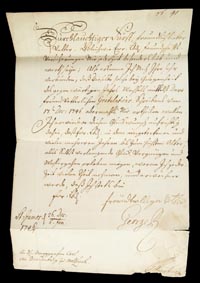 |
George II (1683-1760) King of England and Ireland (1727-60). Manuscript Letter Signed ("George R") To Carl Wilhelm Friedrich, Margrave of Brandenburg (1712-57), a spendthrift who left his son and heir a debt of 2.3 million Reichtsthaler, offering congratulations. Untranslated, but one of von Brandenburg's four illegitimate children (Louise Charlotte) was born in 1746. Soiled with considerable wear; seal missing from integral address leaf. Large bold signature.
Estimated Value $300 - 500
View details and enlarged photo
| Realized
$336 |
Lot 69 |
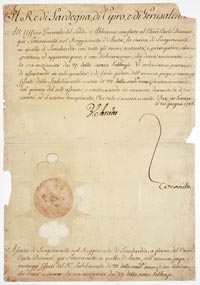 |
[Italian Royalty] Victor Amadeo III & Umberto II, Document Signed by Victor Amadeo III as King of Sardinia, Cyprus and Jerusalem, Turn, June 30, 1786. Countersigned by his Minister of War, General Giuseppe Ruffinoto Coconito di Montiglio. Military appointment. with large ornate cut paper seal. Repairs to verso; small areas of paer loss at edges, not affecting signatures. With a Signed Photo of Umberto II, last King of Italy, 7 x 4½ inches, dated 1957. Very fine.
Estimated Value $200 - 300
View details and enlarged photos
| Unsold |
Lot 70 |
 |
King Hussein and Queen Noor (1935-1999) King of Jordan (1952-99) and his 4th wife, American-born Lisa Najeeb Halaby (1951-), who took the name Noor al Hussein.Card signed as King and Queen of Jordan, below an engraved greeting: "With our best wishes, regards and the Season's Greetings," facing a photograph of three of their children, 8 x 10 in., c. 1980s. The brown cardstock covers have an embossed crown and is bound with a green, white, and red ribibon. Very fine.
Estimated Value $250 - 300
View details and enlarged photo
| Realized
$300 |
Lot 71 |
 |
Napoleon I (1869-1821) French military and political leader; Emperor of the French (1804-15). Autograph Manuscript, five lines in Napoleon's hand from the autograph manuscript of his Memoirs, 3¼ x 8 inches. Beginning, "au mois de mai 1795 Napoleon quitta le commandement de l'armée d'italie…." ["In May 1795 Napoleon left the command of the Army of Italy."] Certified at the foot by Napoleon's companion and biographer Emmanuel Las Cases, "écrit par Napoleon à Longwood 1816" ["written by Napoleon at Longwood 1816."], " Passy, June 1, 1824…"
Under the terms of the Treaty of Fontainebleau, Napoleon was exiled to the island of Elba in April 1814, but managed to escape less than a year later (February 26, 1815) and took power for "the Hundred Days." Defeated at Waterloo on June 18, 1815, by British and Prussian forces led by Wellington and von Blücher, Napoleon was sent in exile to the remote island of St. Helena, where he lived until his death on May 5, 1821.
Longwood was the home of the former Lieutenant-Governor into which Napoleon moved in December 1815. Count Emmanuel Las Cases (1766-1842), a former naval officer who spoke English, was Napoleon's secretary on St. Helena. Napoleon dictated his memoirs to Las Cases and his son, also named Emmanuel and called "young Las Cases" until Las Cases was expelled from St. Helena by Governor Sir Hudson Lowe in November 1816. From his own notes, Las Cases would publish the very successful Memoires of the Life, Exile and Conversations of the Emperor Napoleon in 1823.
After Las Cases departure from St. Helena, Napoleon continued to dictate to others, but had not finished his memoirs when he died. Memoirs of Napoleon was published in 10 volumes (1829-1831) by Louis Antoine Fauvelet de Bourrienne, who had been Napoleon's private secretary from 1797 to 1802. A fragment of Napoleon's memoirs, written in his own hand, is extremely rare.
There is a stamp at lower right from the Bibliotheca Lindesiana, a noble Scottish library started by the Lindsay family in the late 16th century, among whose collection were documents of the French Revolution and the Napoleonic period. Due to a reversal of the family fortune in the 1880s, many of the books were sold off. Those pertaining to Napoleon were probably sold to Quaritch in 1924 or by auction in 1947/48.
Estimated Value $20,000-UP
View details and enlarged photo
| Unsold |
Lot 72 |
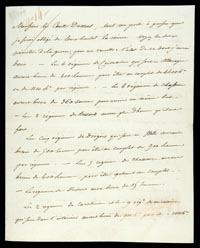 |
Napoleon I, Letter Signed ("Napoleon") as Emperor, with substantial parts of two sentences crossed out and replaced with corrections in Napoleon's own handwriting, 3¼ pages, 9 x 7¼ inches, Paris, April 18, 1811. To the Count Dumas, Director General of Conscription and Inspection, with detailed instructions regarding increasing to the full complement the number of troops in the various regiments. In small part: "…I will be obliged to raise the reserve soon. See the two ministers of war in order to give me the state of what I will need. The 4 regiments of cavalry which are in Germany will need 400 men to be at the complement of 4400 men….The 4 regiments of light infantry [Chasseurs] will need 360 men to reach the same goal. The 2 regiments of Hussars will have more men than needed. The five regiments of Dragoons which are in Italy will need 500 men to be at the complement of 900 men per regiment. The 5 regiments of light infantry will need 400 men to be equally complete. The regiment of Hussars will need 15 men. The 2 regiments of Carabiniers [heavy cavalry] and the 9 regiments of Cuirassiers [armoured cavalry] which are in the interior will need 900 men….The 3 regiments of light cavalry which are in the interior will need 400 men to be at their complement of 900 men. The 3 regiments which only had one company in the interior will need 400 men.
You will find details in the Office of War Administration. Independently of that, I would like, by calling up the reserve, to increase the strength of five regiments of Dragoons in the Army of Italy by 100 men, and instead of 900 men carry them to 1000 men as well as the strength of the seven regiments of Chasseurs and of the regiment of Hussars. That will make therefore an increase of 1300 men. I would like to carry to 1100 men the eleven regiments of Carabiniers and of Cuirassiers which are in France, instead of 1000 men which is their present strength, as well as the regiment of Hussars which is in France; which will make an increase of 1200 men…." He continues with more details, including the fact that he wants two chapters on the cavalry in the report Dumas will submit to him; it is here that Napoleon crosses out a line and a half of text and writes in his own hand.
Napoleon's relationship with Russia was deteriorating due to Russia's refusal to implement Napoleon's Continental System (restricting trade with Britain) and other slights (see lot 76). He started to build up his forces, as evidenced here, and in June 1812 invaded Russia. It was the beginning of the end for Napoleon.
Estimated Value $15,000-UP
View details and enlarged photos
| Unsold |
Lot 73 |
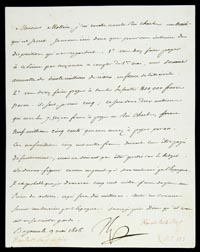 |
Napoleon I, Manuscript Document Signed ("Np"), one page, 9 x 7 inches, Bayonne, May 9, 1808. To Monsieur (A.M.) Mollien, Minister of the Public Treasury in Paris.
"Monsieur Mollien, I have concluded a secret treaty with King Charles [of Spain]. I am only writing you therefore, to let you know the arrangements which concern you: 1. You are to see to it that this Prince is paid in twelve monthly instalments, beginning May 1st, an annual sum of 30 million reals, as the yearly allotment to a Chief of State; 2. You are to pay all his children 400,000 francs per year; there are five of them, I believe. Therefore, that will come to two million which, together with the 7,500,000 francs to be paid to King Charles, will total 9,500,000 francs which you will have to pay yearly. These 9,500,000 francs must definitely be paid to them, but they are not to appear on the budget. They are to be shown as a loan which will be repaid by Spain. It is probable that I will give an additional 500,000 to the Prince [Ferdinand] of the Asturias; that would make the total 10 million francs. All these sums will be repaid by Spain…."
Spain was officially a French ally but after the Spanish fleet was destroyed at Trafalgar (Oct. 26, 1805), and after the Jena campaign of 1806, calling for the Spanish people to rise up against un unnamed enemy, Napoleon was under no illusions. Spain was ruled by Charles IV (1748-1819) the last surviving Bourbon king in Europe. Weak and vacillating, he was completely dominated by his wife, Maria Luisa, and her favorite, Manuel de Godoy. Ferdinand, Prince of Asturias and heir to the throne, feared that Godoy planned to exclude him from the succession and, in the fall of 1807, wrote a letter to Napoleon asking for his support. His appeal was discovered and he was arrested and charged with trying to overthrow his father and forced to write a humiliating letter of apology.
Using as an excuse the terms of the Franco-Spanish alliance which permitted France to send reinforcements to Portugal through Spain, Napoleon sent 55,000 troops into Spain in January 1808. The Spanish court, including Charles, Ferdinand, and Godoy, tried to escape but were stopped by a mob and Charles was forced to abdicate in favor of Ferdinand. The French ignored Ferdinand and opened negotiations with Charles, who was persuaded to write a letter that he had been forced to abdicate against his will. Unaware of this and having received an invitation to come to Bayonne by Napoleon, who assured Ferdinand that he would acknowledge him as King as long as the abdication had been of Charles' own will, Ferdinand arrived in Bayonne on April 20. Soon after arriving, he was informed that Napoleon had decided that the Bourbon dynasty in Spain should be replaced by a French prince, and when Ferdinand refused to abdicate, Charles was summoned to Bayonne. On May 6th, Ferdinand was finally "persuaded" to return the throne to Charles, only to discover that Charles had abdicated on May 5th in favor of Napoleon.
On May 9th, Napoleon sent instructions to his Minister of the Public Treasury to make monthly payments to Charles and his children, including, probably, Ferdinand, who, interestingly enough, did not give up all claims to the Spanish throne until the next day, assuring, we suppose, that he would receive the 500,000 francs mentioned by Napoleon in this letter. Ferdinand would be imprisoned for the next seven years. As word got out to Spaniards of what had transpired at Bayonne, a series of uprisings began. Rather than solving Napoleon's problems in Spain, Bayonne was just the beginning.
Estimated Value $15,000-UP
View details and enlarged photo
| Unsold |
Lot 74 |
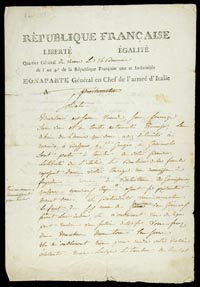 |
Napoleon I, Manuscript Document Signed ("Bonaparte") on his stationery as Commander-in-Chief of the Army of Italy, two pages, 11½ x 7¾ inches, Headquarters at Verona, the 1st of Brumaire, year 4 of the Republic (Nov. 4, 1796). An inspiring speech to his soldiers during the Siege of Mantoua (July 4, 1796-Feb. 2, 1797), which was part of the War of the First Coalition.
"Soldiers! Mantoua is without food, without cheese, without wine, and is in dire extremity. [Austrian General] Wurmser, the remnants of the army which you destroyed at Roveredo, at Bassano, at St. Georgio, at Governolo, is ready to fall into your power. The liberty of Italy, the good fortune of France, rest with your courage. A collection of fugitives, of recruits, of battalions, of garrison troops, and several new corps which do not know you, dare to place themselves in your way. They make believe that they will deprive you of the rewards of six months of hardships [Napoleon substituted 'hardships' for 'glory' which he had originally written and then crossed out]. Your generals will do their duty, they will not overlook anything that can bring you a decisive success. You will make the advance under intelligent leadership. They forget nothing which will provide a brilliant victory.
But the time has come for the drum of battle to be sounded. The time has come when it is necessary to advance upon the enemy in this gloomy silence [of the enemy] which is your assurance of victory: Soldiers be worthy of yourselves. I speak only two words to you; they are enough for Frenchmen. Italy, Mantoua, the peace of Europe, the good fortune of your people will be the outcome of your courage. Let us do once again that which we have done so often and Europe will no longer deny us the title of the bravest army and of the most powerful nation in the world. Bonaparte."
Within days after this speech, the French suffered defeats at the Second Battle of Bassano (Nov. 6), at the Battle of Calliano (Nov. 7), and at the Battle of Caldiero (Nov. 12). While maintaining a brave front for his soldiers, Napoleon wrote to the Directory on Nov. 13th, "All our superior officers, all of our best generals are hors de combat. The Army of Italy, reduced to a handful of men, is exhausted….The Corps have remaining only their reputation and their pride….Perhaps the hour of the brave Augéreau, of the intrepid Masséna, of my own death is at hand…." Tempted to give up, Napoleon trusted in his genius and attacked the Austrians once again. The French victory at the Battle of Arcola, Nov. 15-17, was the decisive battle in Napoleon's defeat of the Austrians' third effort to raise the siege of Mantua. Mantoua would finally surrender on Feb. 2 and come under French administration until it was retaken by the Austrians in 1799.
Estimated Value $15,000-UP
View details and enlarged photos
| Unsold |
Lot 75 |
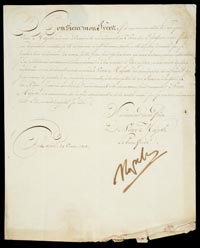 |
Napoleon I, Manuscript Document Signed ("Napoleon") as Emperor, one page, 9½ x 8 inches, Paris, Oct. 29, 1808. To his elder brother Joseph (1768-1844), congratulating him on his accession to the Spanish throne (1808-13). "Sir my Brother, I received with sensitivity the letter that Your Majesty wrote me on the occasion of your accession to the Throne of Spain and the Indes. The friendly feelings that it shows toward me greatly touched me and you must be persuaded that I sincerely share the wishes that it expresses that the bonds that join us be unbreakable. I will apply myself to constantly maintaining them and to tightening them and my most attentive care will be to give on every occasion to Your Majesty definitive witness that I will not cease to care for your personal prosperity. and for the glory of your Reign. I seize with eagerness this occasion to renew to Your Majesty the assurances of perfect attachment and of the tender friendship that I will always maintain for you and with which I am Sir my Brother, From Your Majesty the good Brother Napoleon."
A lovely double seal is affixed to the integral address leaf. Some creasing to right margin of letter; lower edge is ragged, affecting nothing. Napoleon's signature is extremely bold and signed in full. Napoleon had made Joseph King of Sicily and Naples in 1806. In 1808, he put Joseph on the Spanish throne, just as the Peninsular War broke out. Joseph's hold on power was always tenuous; everyone knew who the real power behind the throne was. Joseph's one real contribution was ending the Inquisition. With Napoleon's defeat, Joseph went into exile in the United States (1817-32), and his home in New Jersey became a center for expatriot intellectuals. He died in Florence, Italy and was buried in Les Invalides.
Estimated Value $15,000-UP
View details and enlarged photos
| Unsold |
Lot 76 |
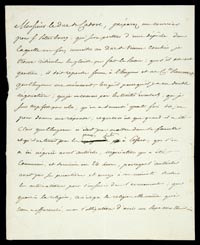 |
Napoleon I, Manuscript Letter Signed ("Nap"), with two words added in Napoleon's hand, 1½ pp, 9 x 7¼ in., Paris, March 16, 1810. To the Duke of Cadore (Jean-Baptiste de Nompère de Champagny, 1756-1834), Ambassador to Austria and Napoleon's Minister of the Interior and Foreign Affairs, voicing his growing suspicions of the Russian Czar.
"Have a courier readied for St. Petersburg, who will take a dispatch in which you will tell the Duc de Vienne how ridiculous I find the complaints that Russia is making; and that if necessary, he should inform the Emperor [Czar] and Count Romanzoff that the Emperor misunderstood me in thinking there have been two sets of negotiations; and that I do not know what the eventual treaties will be; and that I am very strongly in favor of it; that on four occasions ten days have been requested for a reply. We did not open negotiations with the Austrians here until it became clear that the Emperor was not the master of his own house [n'était pas maître dans sa famille] and that he was not keeping his promises made at Erfurt….Austria had taken the precaution of sending her Minister [Metternich]with full authorization for all eventualities. As regards the question of religion, it is not religion itself which has alarmed us, but the obligation to have a Pope present at the convention. I have nothing more to say except that I could not ratify an act made without consideration….one which makes me a party to absurdities." The words "promises faites" on the first page are added in Napoleon's hand, substitutions for two deleted words.
In 1808, the war in Spain and Austria's military preparations made it expedient for Napoleon to seek a rapprochement with Russia. A secret agreement was made (the Erfurt Convention) which confirmed and renewed the Treaty of Tilsit (1807), which had been made between the two countries at the conclusion of the War of the Fourth Coalition. "His Majestiy the Emperor of the French and His Majesty the Emperor of all the Russias confirm and, in as far as there is need, renew the alliance concluded between them at Tilsit; binding themselves, not only not to make any separate peace with the common enemy, but in addition not to enter into any negotiation with it, and not to listen to any of its proposals except by common consent." Napoleon hoped that by recognizing certain Russian claims he could be assured of Russian support in the event of war with Austria; however, when war broke out with Austria in 1809, Czar Alexander did next to nothing and Napoleon became increasingly frustrated.
Additionally, the alliance between France and Russia was supposed to be cemented by the marriage of Napoleon to Czar Alexander's 13-year-old sister, Anna Pavlovna. When the marriage was vetoed by Russian officials, Napoleon was furious and stated (in this letter) that Alexander was not "master in his family" as he was not keeping promises made at Erfurt. Napoleon immediately turned to Austria and made an agreement to marry Marie Louise, the 17-year-old daughter of Emperor Francis II of Austria. Napoleon states in this letter that he did not open negotiations with Austria until Russia had breached her promise. French-Russian relations continued to deteriorate and in 1811, Napoleon declared, "…in five years I shall be master of the world: there only remains Russia, but I shall crush her." His failed invasion of Russia in 1812 was the turning point of the Napoleonic Wars.
Estimated Value $12,000-UP
View details and enlarged photos
| Unsold |
Lot 77 |
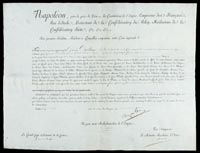 |
Napoleon I, Partly-printed Document Signed ("Napoleon") as Emperor, vellum, in French, 17¼ x 22¾ inches, Dreule (France), September 27, 1812. Granting a full pardon for "Gerard Caillou rifleman in the Battallion of the National Guard operating in the department of Gers condemned…to three years of community service and a 1500 franc fine for the crime of desertion…." Light scattered foxing on verso and minor edge creasing. An exceptional Napoleon document, for its size, condition, and for the full signature with which Napoleon boldly signed.
Napoleon's diastrous invasion of Russia would begin on June 23, 1812, one month and four days after this pardon was issued. Surely the pardon was motivated by the knowledge that he would need every able-bodied soldier available, but like Hitler, some 130 years later, an over-confident Napoleon would ultimately be defeated by Russia. We don't know if Caillou survived the Russian campaign. Of 610,000 members of the Grande Armée who entered Russia, only 100,000 left.
Estimated Value $4,000 - 6,000
View details and enlarged photo
| Realized
$3,300 |
Lot 78 |
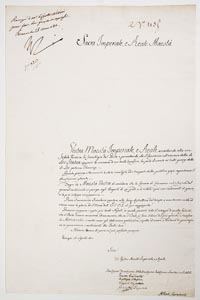 |
Napoleon I, Autograph Endorsement Signed "Np" as Emperor, and endorsed, "Returned to Count Aldini [Minister of Foreign Affairs] to draft a reply. Trianon, 28 August 1811," one page, 16 x 10¼ inches, Venice, Aug. 16, 1811. The letter is ornately addressed to Napoleon as "Sacred Imperial and Royal Majesty." Signed by four Venetial dignitaries, including Papadopoli. The merchants express their profuse thanks and profound gratitude to Napoleon for having made "loyal Venice" a Free Port and have had a statue erected to him.
The day before, on Napoleon's birthday, the eight-foot marble statue of him by Domenica Banti was unveiled in St. Mark's Square. It depicts Napoleon as Caesar, holding a globe in his left hand. It stood in St. Mark's Square from 1811 until 1814. The statue is still the subject of much controversy. It was sold in 2002 at Sotheby's, New York, and donated to Venice's Correr Museum on St. Mark's Square. Many Venetians sought to prevent its return and in 2003 staged a war-crimes trial of Napoleon in the museum. Napoleon is reproached for having abolished the Venetian Republic and looting its artistic and historical patrimony. His defenders allege that he replaced the ideas of an outworn regime with egalitarian, revolutionary ideals.
Estimated Value $2,500 - 3,500
View details and enlarged photo
| Unsold |
Lot 79 |
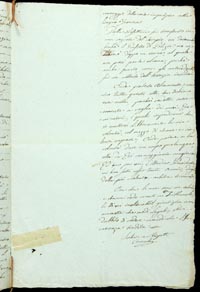 |
[Napoleon I] An Appeal From Napoleon's Would-be Assassin, Autograph Document Signed "Ceracchi," five pages, 12 x 8 inches, n.p. (in police custody), n.d. (c. January 1801). In Italian. Roman citizen Giuseppe Ceracchi makes an appeal to the president of the "Giuri d'Accusazione." In brief, Ceracchi demands an interpreter because his French is not good enough to defend himself in court. He bitterly complains of the denigrating treatment he has received from the authorities both during and after his arrest. He states that he was arrested at the Theatre of the Opera and treated like the vilest thief. He had been assured of pardon in the name of the First Consul, with the guarantee of the Police Chief, because he had denounced his accomplices. He accuses the police of using illegal methods of interrogation. Now he finds himself before a court and feels sure that he will be vindicated.
Ceracchi, an Italian sculptor, was part of the "conspiration des poignards,"(the "dagger conspiracy"), a Jacobin plot to assassinate Napoleon at the opera house. He was arrested on October 10, 1800, along with François Tobino-Librun, Joseph Diana, and Dominique Demerville. The evidence was questionable and the inclination was to pardon but on December 24, 1800, another attempt on Napoleon's life (the rue Saint-Nicaise plot, or the "infernal machine") came close to succeeding and all thought of leniency was abandoned. On January 19, 1801, all four of the "dagger conspiracy" plotters were found guilty of trying to assassinate the First Consul and condemned to death. They were executed on January 31, 1801. The document is bound with string; a couple of old tape repairs, else fine.
Estimated Value $5,500-UP
View details and enlarged photos
| Realized
$4,800 |
Lot 80 |
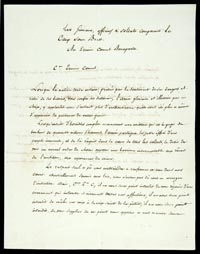 |
[Napoleon I] Marshal Charles Pierre Augereau, 1st Duc de Castiglione (1757-1816) General and Marshal of France. Manuscript Letter Signed ("Augereau"), with a 4½ line Autograph Postscript, as General Commanding, on his official letterhead, one page, 11 x 8½ inches, Paris, 16 floreal an 12 de la République (May 6, 1804). To General Donzelet, chef de l'Etat Major Général de l'Armée, accompanied by a two-page draft speech from the generals, officers, and soldliers at Brest (Brittany) urging Napoleon to become their Emperor.
On May 18, 1803, The Senatus Consultum awarded Napoleon the title of Emperor. This action was preceded by messages of support from across the nation. Augereau's letter to General Donzelet says, in part, "You will find attached, my dear General, a speech that we have to have signed by the Army….I would like General Lamarque to take charge of bringing it to Paris…it must be presented next Sunday…it is necessary to have it transcribed on fine paper…." In a holograph postscript, Augereau writes, "General Lamarque and Albert and Jouque can all three leave…My brother has just been named Genéral de Brigade…."
The draft speech pays florid compliments to Napoleon, appreciating "the power of your genius" and stating that "A great state needs an irremovable leader; it needs an invariable order of succession. This order is…not at all incompatible with liberty. Be then, Comrade First Consul, be our Emperor, without ceasing to be the father of the country…."
On May 18, Napoleon proclaimed himself Emperor. On May 19, Augereau received a Marshal's baton. After Napoleon's first exile, Augereau served Louis XVIII. Upon Napoleon's escape from Elba in 1814, he went over to Napoleon, who wanted nothing to do with him and charged him with being a traitor. When Napoleon was exiled again, Augereau tried once more to serve Louis XVIII but Louis took away his military title and pension. Thus, a sad end to the military career of a soldier who had once fought with great distinction.
Estimated Value $2,500 - 3,500
View details and enlarged photos
| Unsold |
Lot 81 |
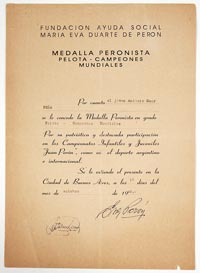 |
Perón, Eva (1895-74) Second wife of Juan Perón and First Lady of Argentina from 1946-74. Document Signed, Oct. 17.1949. Awarding the "Perón Medal" to Antonio Omar Peña for his patriotic and distinguished participation in the "Juan Perón Children and Adolescents Games…." Small chip at lower edge, else fine.
Estimated Value $200 - 300
View details and enlarged photo
| Realized
$240 |
|
|